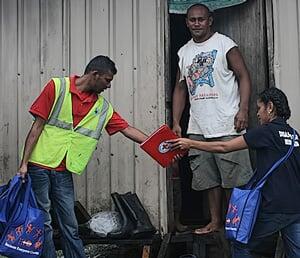In the last couple of months, Fiji has seen some of its worst flooding, particularly in the Western Division and the upper reaches of the Sigatoka River. Floodwaters wreaked havoc and destruction in its wake.
Images of Nadi town and villages under water were almost surreal but the loss that followed incapacitated hundreds of families with some losing everything: weeks later, people were still trying to pick up the pieces in evacuation centres and villages.
But out of the chaos and pain, came acts of kindness and solidarity: musicians entertained for free at fundraising events, organisations collected clothes, and even former Fiji residents pitched in.
Nailuva Village from the province of Ra gave food (30 bags of taro, 20 bags of cassava and 10 bags of taro leaves) from their subsistence gardens to feed those who'd fled to evacuation centres.
Also colleagues at UNFPA, the United Nations Population Fund, were involved in seeing the damage for themselves, and did witness the resilience of the people coming through their smiles despite being in dire straits; ever generous with their time and always, the invitation to share a meal: indeed experiences the team will not forget.
The fact that communities organised themselves into units that made those first few days bearable, before official assistance arrived, was a remarkable testimony of both resilience and the culture of caring beyond ones' belonging and creed.
In the Sigatoka Valley, a farmer disclosed how she lost an acre of her farming patch to the swift floodwaters; now she has only one acre of fertile land left.She has begun planting in an area further from her home, cutting into the time she used to have for her other responsibilities like caring for her children.
In a settlement in Nadi, a man discussed how he lost his wife because her untreated deteriorating mental health since their daughter was thrown into the river after being raped, last year.
Her sense of loss was compounded by the floods which destroyed their home; she did not even have the heart to go to higher grounds.
By the time she was taken to hospital from an infected foot injury, it was too late.
Stories shared with our team were heart-wrenching and we appreciate so very much the time people took to speak to us; in a way they are helping so many more people because it will now inform our next steps in making sure that humanitarian relief is better co-ordinated and refined to the sensitivities that go with it.
There were many lessons people in the midst of this chaos taught us.
Questions of how much longer natural resilience could continue to maintain the fabric of our society in such times, implicit of why we as outsiders must improve our responses, in particular our existing (mental) coping mechanism. We all know for example how disconcerting it can be to start again from scratch, never mind having to do it in completely new surroundings.
UNFPA worked with the Fiji Red Cross Society (FRCS) to carry out one of its main responses as far as humanitarian efforts in times like natural disasters are concerned: the provision of 'dignity' packs or emergency kits.
Primarily prepared for women, these packs usually include soap, flip-flop, towel, sulu, underwear, condoms, sanitary pads, toothpaste, comb and/or washing powder.
UNFPA does not deny that men and boys are also impacted but our focus on dignity packs for women stems from the recognition that relief efforts too often ignore the special needs for women and girls.
Globally-speaking, our focus on natural disasters is a response to the fact that over the last two decades, such events have quadrupled (mainly floods, cyclones and storms) and over the same period, the number of people affected has increased from around 174million to an average of 250 million per year.
During the distribution of the dignity packs by FRCS volunteers, a series of questions were posed to recipients.
UNFPA asks these questions because what people tell us is crucial to ensuring that our future efforts are effective, efficient and sensitive to the needs of communities and households affected by disaster.
Information gleaned from 50 recipients of the dignity pack and its content, people ranked soap and flip-flop as most important immediately after the flood but clothes and washing powder three weeks after the flood.
Recipients were also asked what they would like to see included in the packs, eight per cent identified baby bottles, and 54 per cent wanted antibacterial soaps.
The survey indicated that the inclusion of condoms in the dignity kits did not cause negative reactions: four per cent of the respondents were unfamiliar with the use of condoms and 84 per cent responded positively; one recipient expressed 'shyness' and four per cent identified the usefulness of condoms for their sons and daughters.
Because disaster situations increase the vulnerability of women to unwanted pregnancies, sexually transmitted infections and/or sexual violation, targeted support to women during this time is one of the best ways to ensure the health, security and wellbeing of families and entire communities.
UNFPA intends to improve data collection exercises working with other UN agencies, government and NGOs, to include for example, information on the number of disabled, pregnant or lactating mothers in the area, the number of young people affected and/or female-headed households, etc.
As we brace for more unpredictable weather patterns because of the changing climate determinants, we want to ensure that our responses are holistic and as much as possible abide by UNFPA's Guide To Working From Within, and its 24 tips for culturally-sensitive programming.
This story was first published in Fiji Times.


